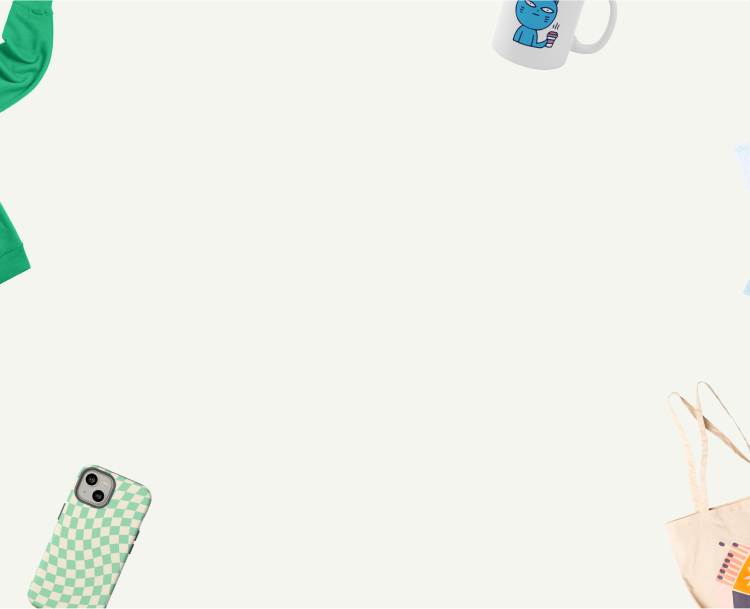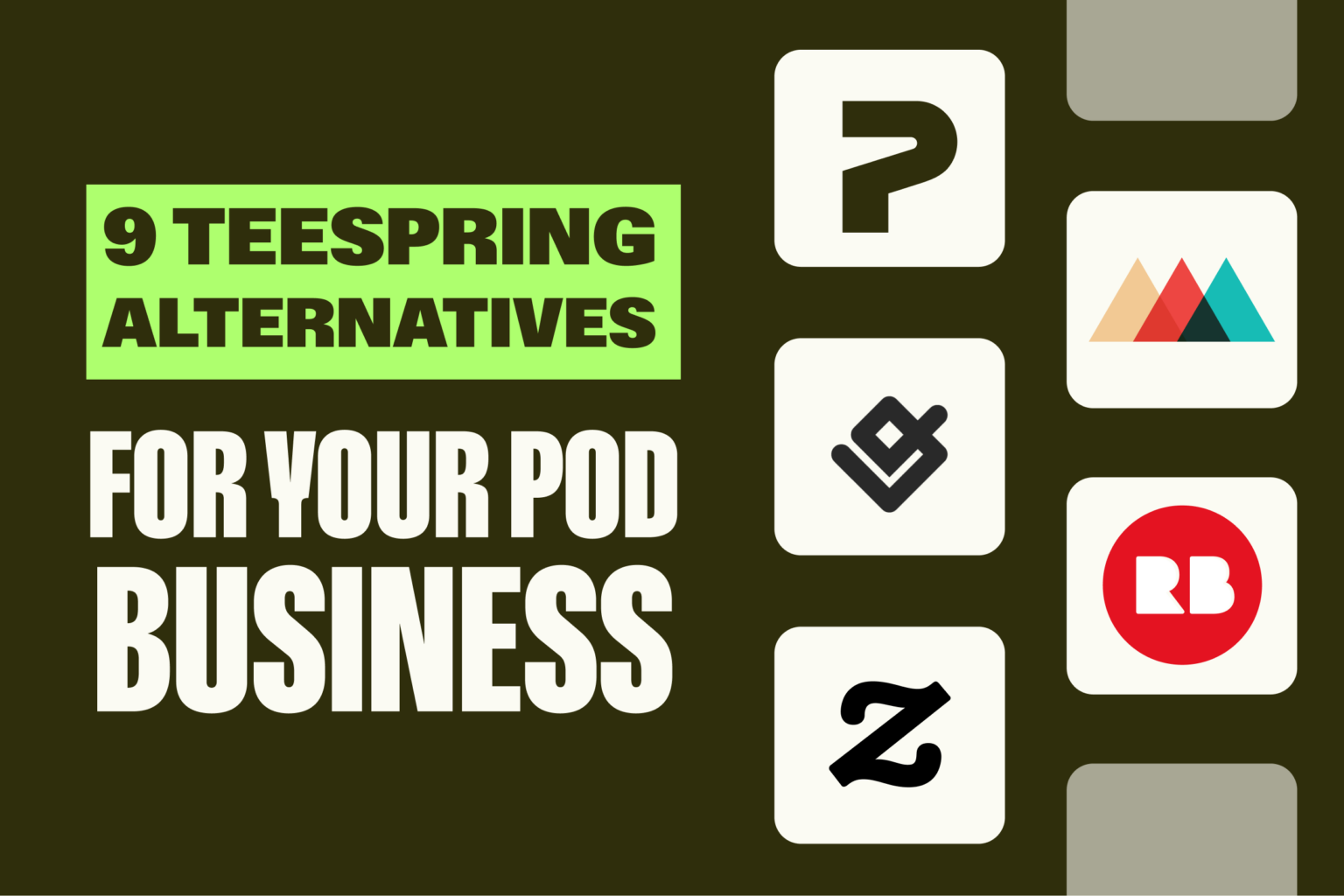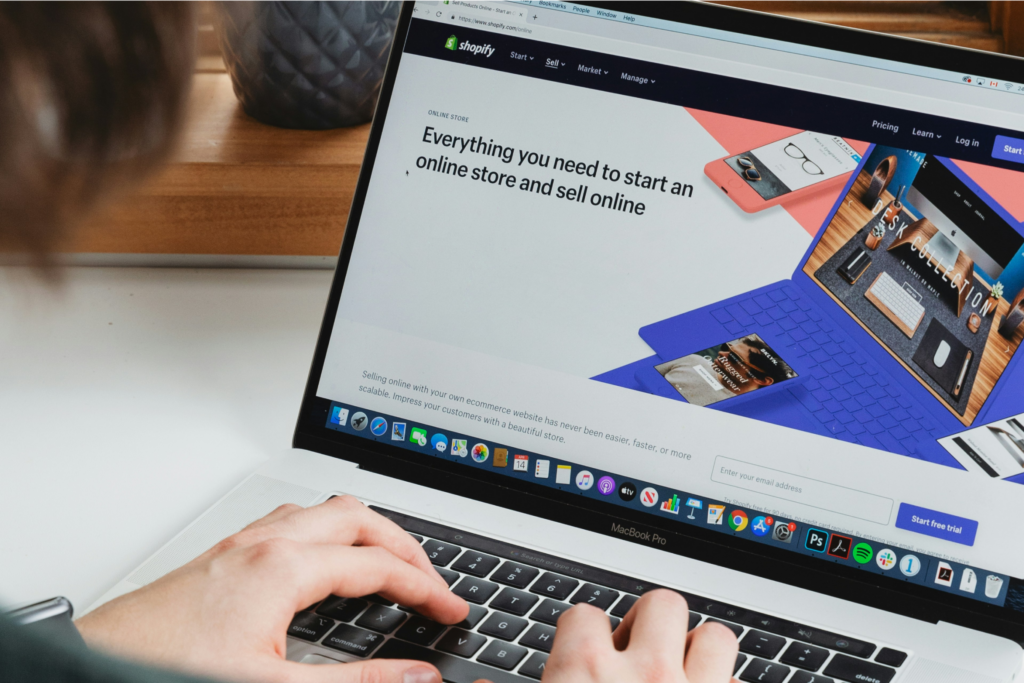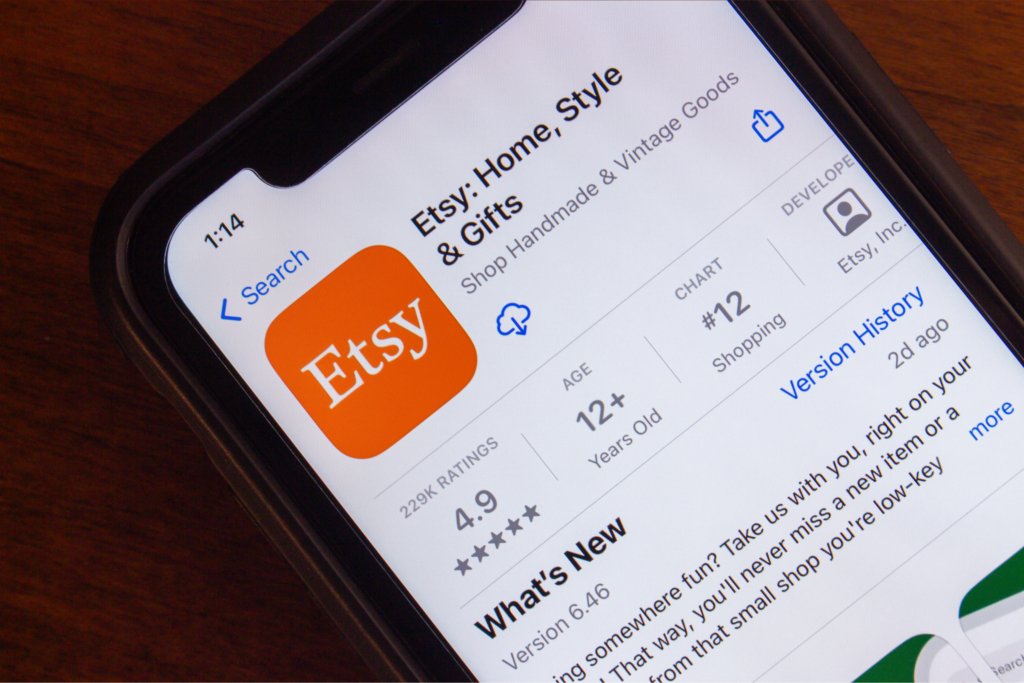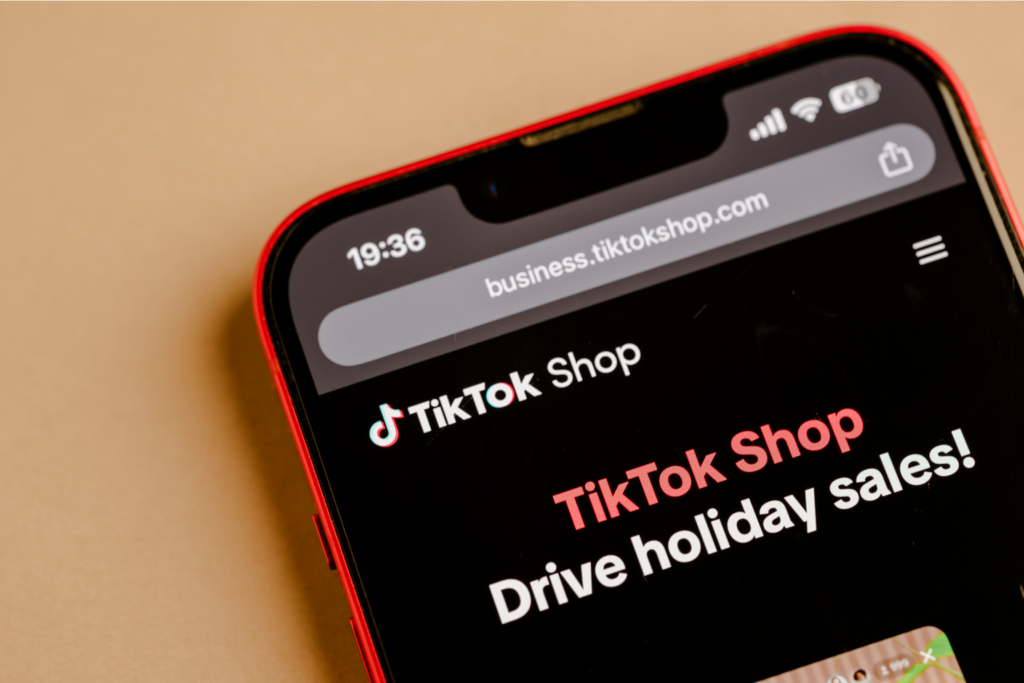Sell custom products with Printify
Teespring (now Spring) is a well-known print-on-demand (POD) company that lets independent merchants launch an online store selling custom physical products. However, it may not offer the flexibility, product selection, or branding features you need to scale your business.
If high base costs, limited customization options, or other challenges are holding you back, explore the bestTeespring alternatives to find the right POD platform for your business.
This post may contain affiliate links, which means we may earn a commission if you make a purchase through those links. This comes at no additional cost to you.
Key takeaways
- Printify is a leading choice for entrepreneurs looking to grow a successful business, offering higher profit margins and a broader product range.
- Other Teespring alternatives, like Printful, have in-house or localized production, which can improve shipping times and product quality.
- Options like Redbubble and Zazzle provide built-in marketplaces, reducing the need for external marketing.
- While most print-on-demand platforms are free, advanced features and additional tools come with a subscription.
- Your business model, profit goals, and preferred level of customization determine which platform is best for you.
Why look for Teespring alternatives?
Teespring is a good option for creators looking to sell bestsellers like t-shirts, posters, and bags. However, other print-on-demand platforms offer lower costs, greater design customization, more integration options, and faster shipping.
Let’s look at Teespring’s main pros and cons before diving into alternatives.
Pros:
- No upfront costs or inventory management.
- Teespring handles production, shipping, and customer support.
- Seamless integrations with Shopify, Instagram, YouTube, Facebook, Twitch, and more.
- Built-in marketplace with an existing audience.
Cons:
- Higher product costs reduce potential earnings compared to other platforms.
- Sales period and minimum profit requirements force sellers to hit specific targets.
- Longer production and shipping times may result in unhappy customers.
- Heavy competition on the platform requires strong branding and marketing.
The 9 best Teespring alternatives
Let’s check out the best Teespring alternatives to help you find the right platform for your business.
1. Printify
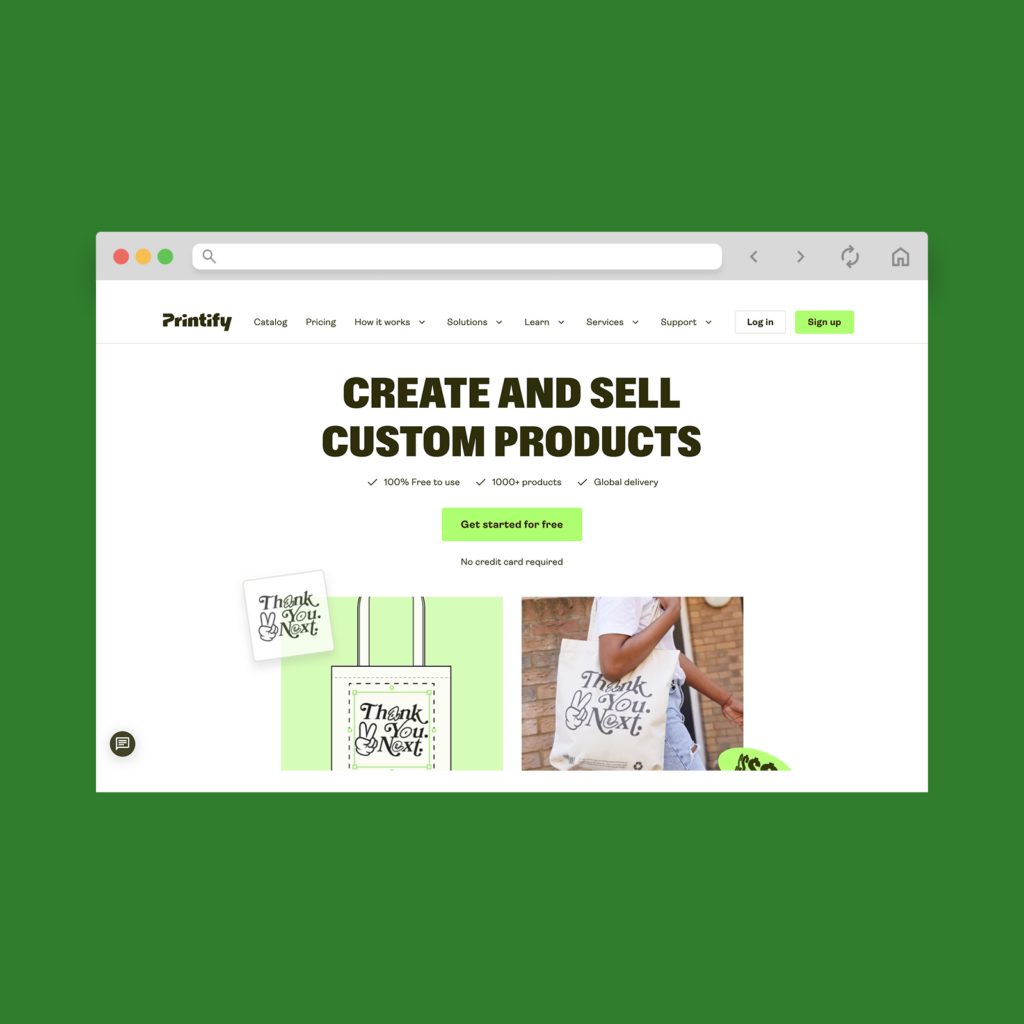
Printify is one of the alternatives to Teespring, hands down. Our extensive Catalog has over 1,300 customizable products, including clothing, accessories, home decor, and more. We have a global network of Print Providers with over 140 facilities, making it easy to expand your business globally.
Printify’s competitive pricing and efficient fulfillment process maximizes profits while reducing hands-on management. The platform seamlessly integrateswith the most popular eCommerce platforms, making it easy to start selling quality products immediately.
Pros:
- Higher profit margins, around 40% for most products.
- Largest selection of custom print-on-demand products.
- Easy-to-use design tools.
- No limits or order minimums – get a single item or hundreds.
- Multiple fast shipping options depending on the Print Provider location.
- 24/7 support, guides, and resources to help you grow.
Cons:
- Product base costs and quality may vary depending on the fulfillment partner.
- Shipping costsand times may be high when using Print Providers far away from your customers.
- Not allproviders offer custom packaging or inserts.
Product count: Over 1,300 products, from custom clothing to decor items and phone cases.
Pricing:
- Free plan. Access to the full Catalog, product creation tools, and integrations.
- Premium plan. $29 per month or $24.99 per month (paid annually), with up to 20% off all products.
- Enterprise plan. Printify offers print-on-demand solutions for large-scale businesses with more than 10,000 daily orders. Custom pricing based on the business.
Best for: Selling custom merchandise at affordable prices across different categories – whether through an online marketplace or your own store.
2. Printful
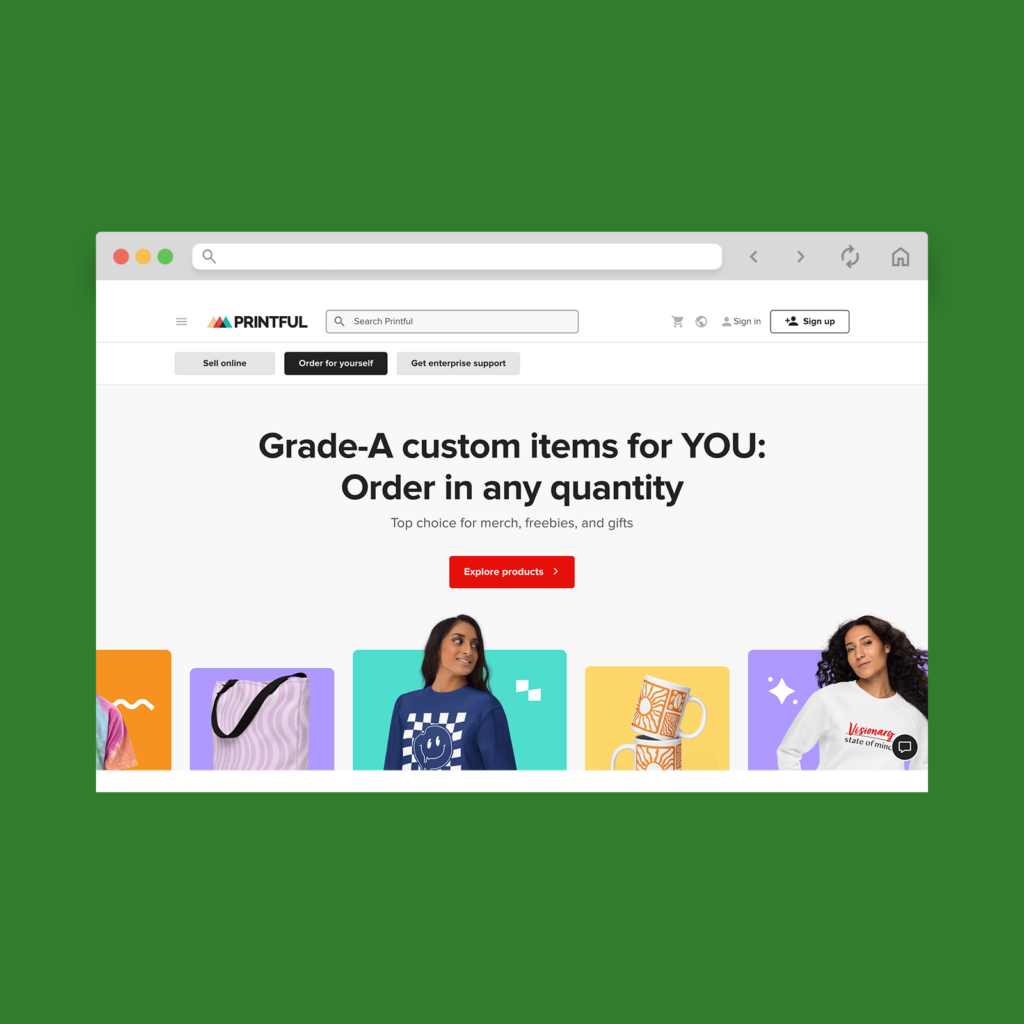
This well-known print-on-demand service offers low production costs and premium-quality customizable merchandise. While many platforms rely on third-party suppliers, Printful has its own global production facilities, making their quality super reliable and fulfillment much more streamlined.
The platform supports integrations with major eCommerce platforms and marketplaces to simplify fulfillment and order management.
Pros:
- Branding options, including packaging and labels.
- No upfront costs.
- Many decoration methods, including embroidery.
- No order minimums or limits.
- Shipping calculatorto give your customers better estimates.
Cons:
- Lower supplier variety and flexibility due to in-house production.
- A smaller product selection compared to some Printful alternatives.
- Slightly higher product costs than other print-on-demand platforms.
Product count: Over 370+ customizable products, including apparel and home decor.
- Printful Free. A free plan with access to basic features.
- Printful Growth.$24.99 monthly, offering discounted product pricing and more branding options.
Best for: Entrepreneurs looking for high-end branding features and reliable fulfillment.
3. Redbubble
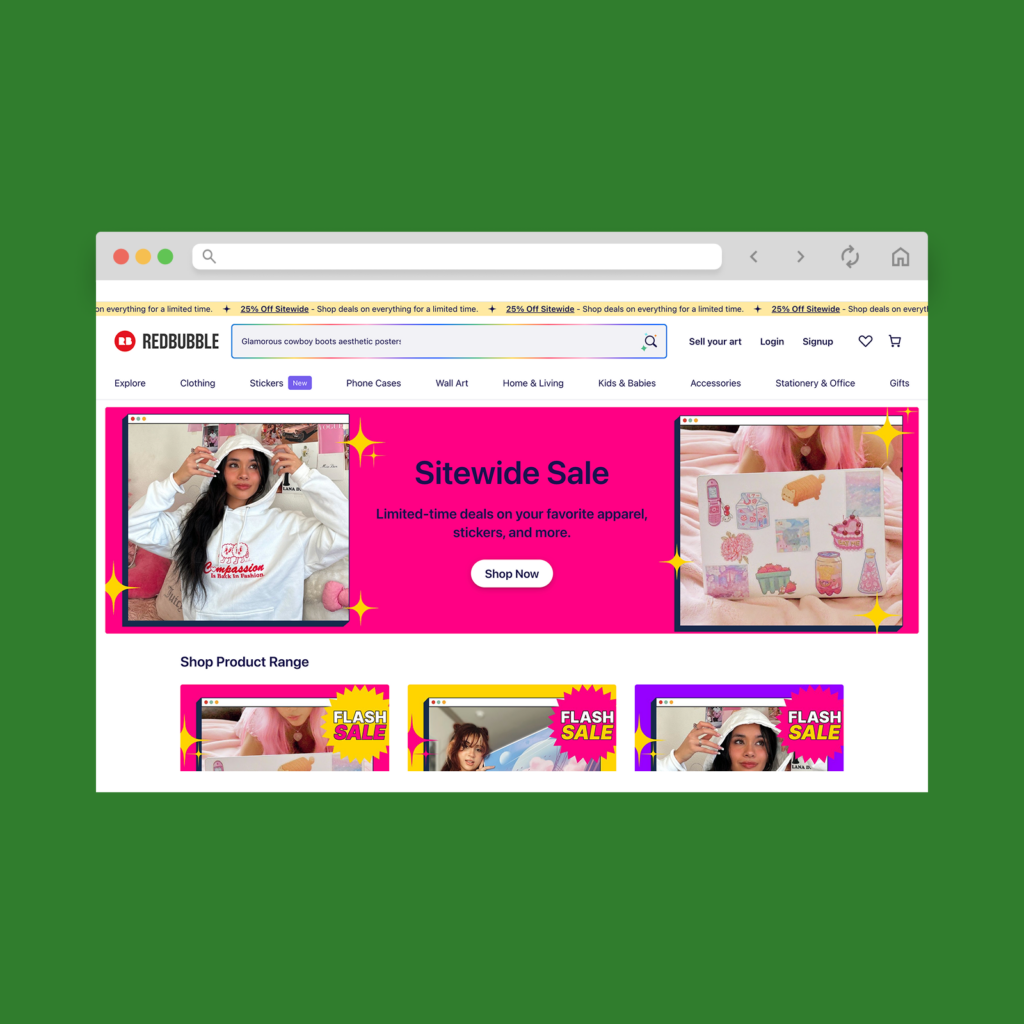
Redbubble is an online marketplace that connects independent artists with a global audience. Unlike other Teespring print-on-demand alternatives, it lets you sell custom products without setting up your own website.
The platform deducts a tier-based commission from each sale. The amount depends on your product’s retail price. Higher tiers offer better exposure and perks, while the default profit margin for sellers is around 20% of the base product price.
Pros:
- Existing customer base.
- No upfront costs or inventory management.
- User-friendly interface.
Cons:
- Limited product selection and control over pricing and branding.
- Intense competition from other sellers on the platform.
- No integrations with eCommerce or social media platforms.
Product count: Redbubble offers over 60 items, including customizable t-shirts, stickers, phone cases, and canvas prints.
Pricing:
- Redbubble is free to use, but you’ll pay a commission on each sale.
Best for: Artists, designers, and creators seeking exposure and a hassle-free way to sell customized products without handling production and shipping or setting up their own artist shop.
4. Gelato
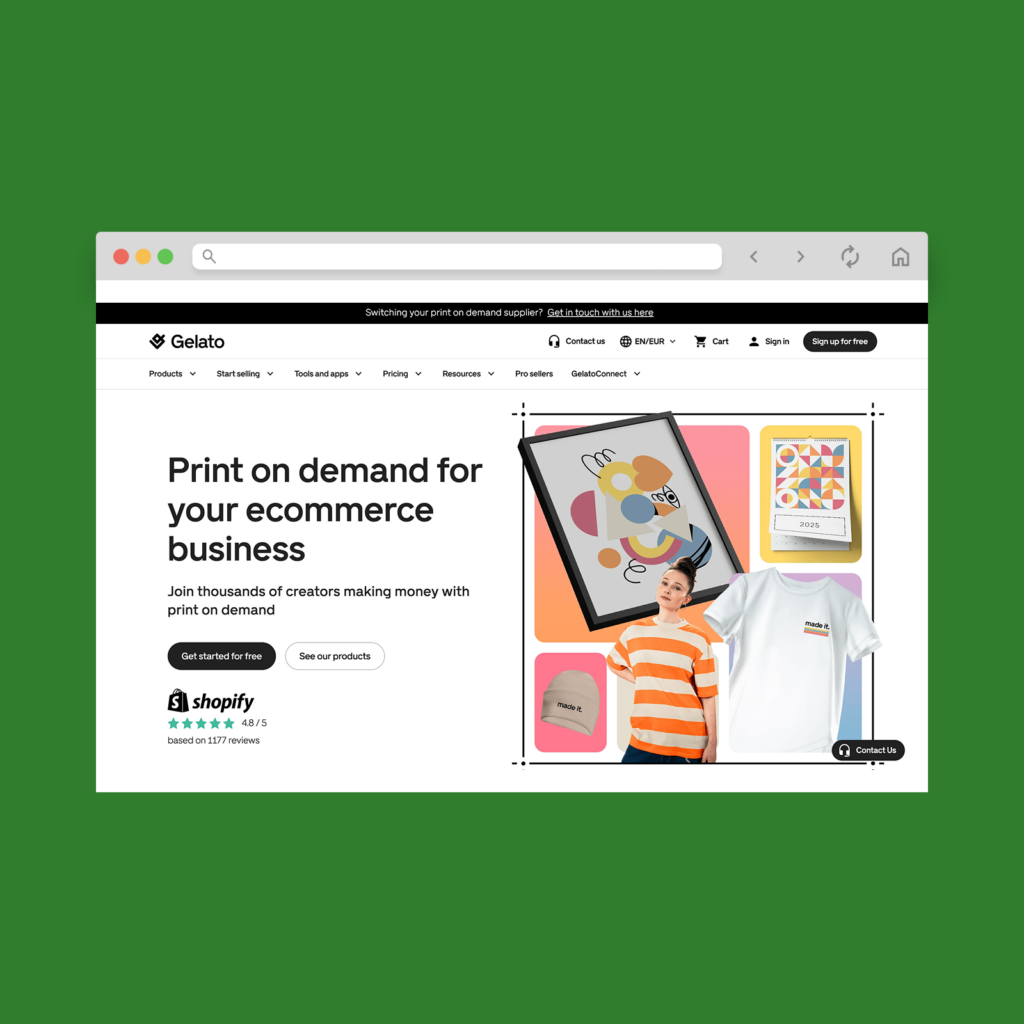
Gelatooperates through a global network of print partners, offering fast shipping by routing orders to fulfillment centers closest to customers. This approach is more environmentally friendly as it reduces the carbon footprint produced by long-distance deliveries.
Their pricing is lower than some other Teespring alternatives and helps merchants achieve a profit margin of 30% to 50% per sale.
Pros:
- Fast delivery and lower shipping fees.
- Integrations with major eCommerce platforms.
- Fair pricing with bulk discounts.
- Overall user-friendly platform.
Cons:
- Fewer branding options compared to other platforms like Printify or Printful.
- Product quality may differ based on the chosen supplier.
- No mockups unless you upgrade to a paid plan.
Product count: Gelato offers over 150 customizable items, including apparel, wall art, mugs, and business stationery.
Pricing:
- Free plan. Access to basic features, integrations, and production prices.
- Gelato+ plan.$25 per month or $249 per year, offering discounted product pricing and premium mockups.
- Gelato+ Gold plan.$129 per month or $1,285 per year, with product discounts and advanced price-setting tools.
- Platinum. Custom pricing tailored for high-volume businesses.
Best for: Entrepreneurs seeking sustainable print-on-demand solutions, offering faster delivery through localized fulfillment.
5. Zazzle
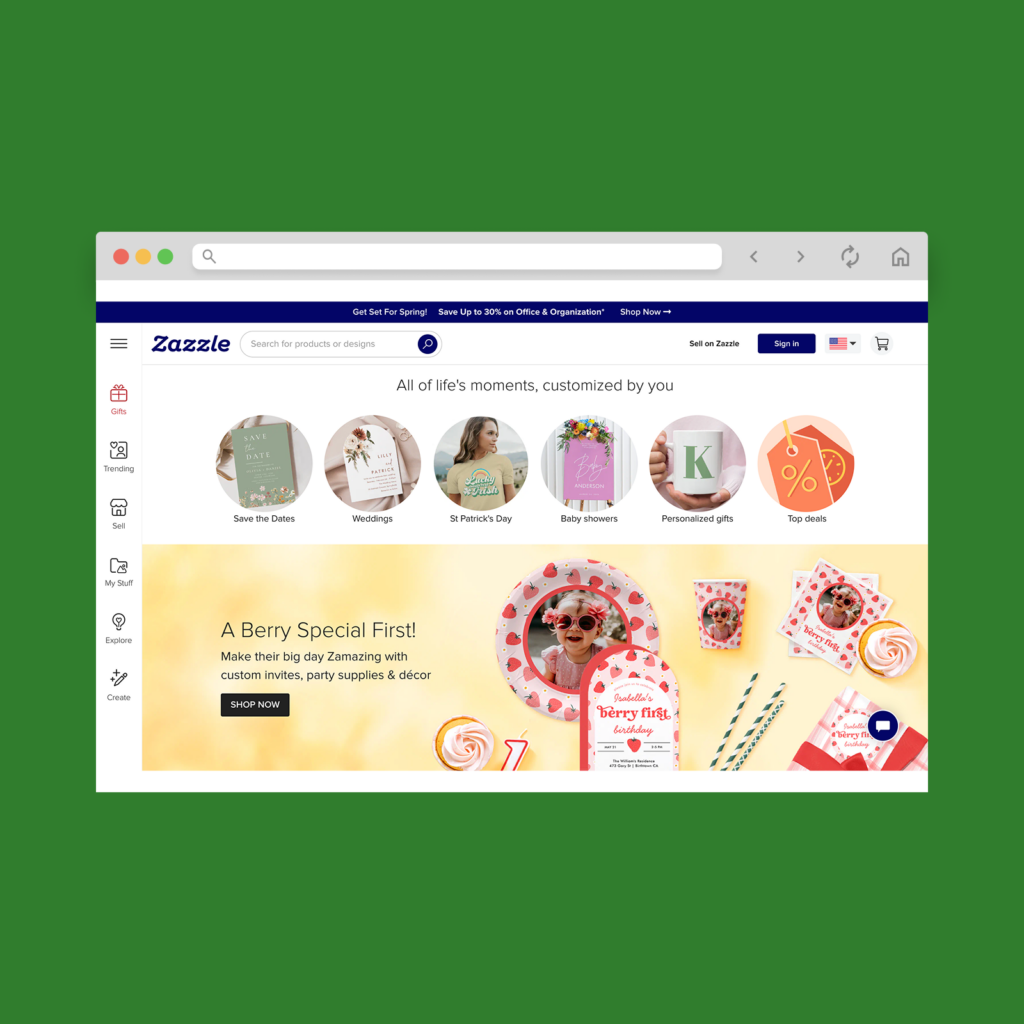
Like Redbubble, Zazzle is a marketplace-oriented platform focusing on unique art products, custom gifts, and digital downloads. You’ll find more niche products here than on many other Teesprint alternatives, like party supplies, sports items, games, and wedding favors.
The built-in audience relieves some of the marketing burden you’d have when running a stand-alone online store.
On the downside, Zazzle takes a 15% commissionfrom each sale plus a volume bonus of up to 17%, which greatly lowers your profit margin.
Pros:
- Large selection of customizable products.
- Access to an existing audience.
- Niche products.
Cons:
- Lower profit potential.
- Limited control over pricing and branding.
- Intense competition with other sellers within the platform.
Product count: Over 1,000 options, including t-shirts, stationery, and sports items.
- Free account with all standard features.
- Zazzle Plus. $19.95 per year, offeringunlimited standard shipping.
- Zazzle Plus Premium. $49.95 per year with unlimited standard and premium shipping.
Best for: Artists and designers who want abuilt-in audience and hands-off order fulfillment while prioritizing exposure over high earnings.
6. Society6
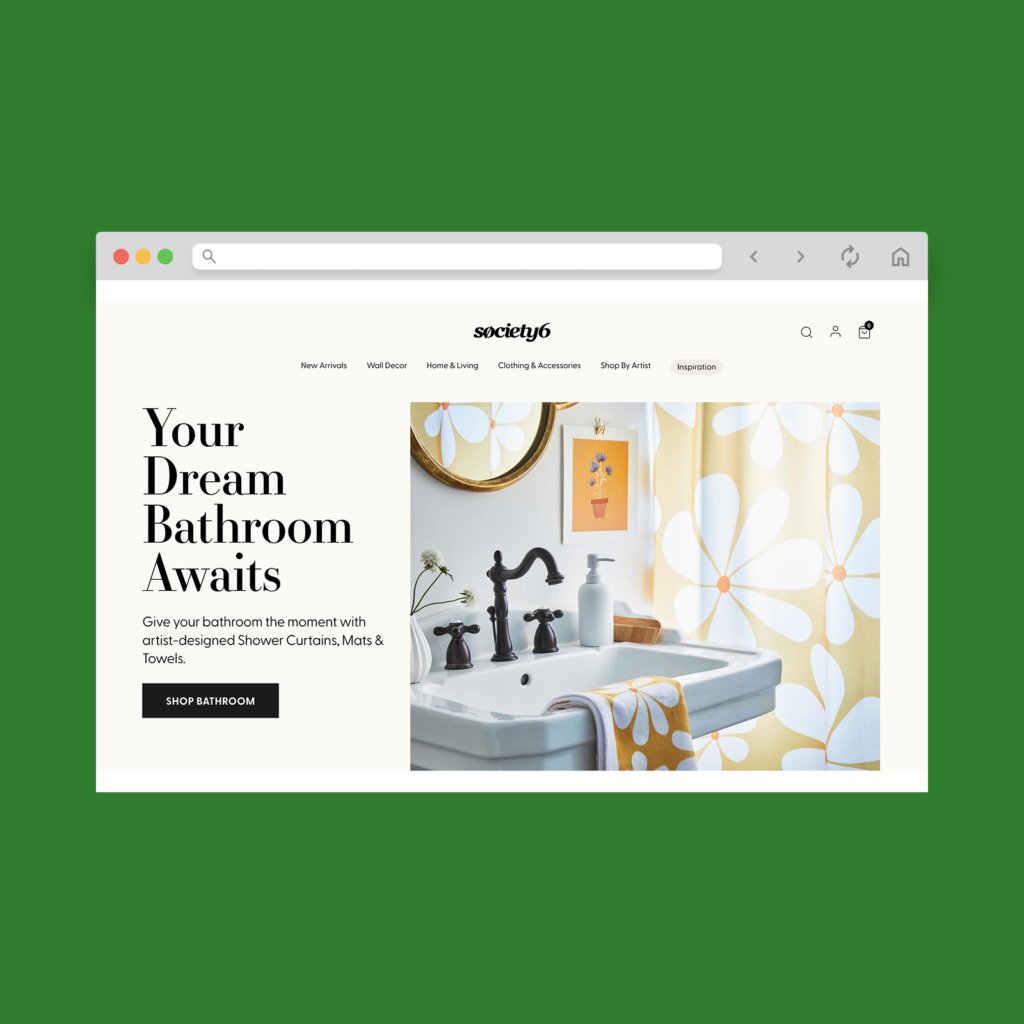
Society6 offers a curated marketplace for serious artists and creatives and connects them with an established audience.
The catalog specializes in home decor, like bathroom and kitchen accessories, but still offers print-on-demand classics like mugs and apparel.
Society6 sets the retail prices, and sellers earn up to 20% per sale – a considerably lower profit margin than other Teespring alternatives.
Pros:
- Access to a built-in audience seeking beautiful art.
- Easy set-up and no upfront costs.
- Reliable fulfillment and customer support services.
Cons:
- Limited product selection compared to alternatives like Printful and Printify.
- Minimal control over pricing and branding.
- Lower profits.
Product count: Over 100 product types, including framed prints, home decor, and apparel.
- Free account. Sell up to 10 designs for free, earning 10% of the net sale.
- Basic. Pay $4.99 per month with a design limit of 100 products and set your own prices.
- Pro.$12.99 per month with a design limit of 10,000 products. You’ll get a 20% discount on the base price when purchasing your own products and can set your own prices.
Best for: Artists willing to make lower profit margins while selling their work to other art enthusiasts.
7. Bonfire
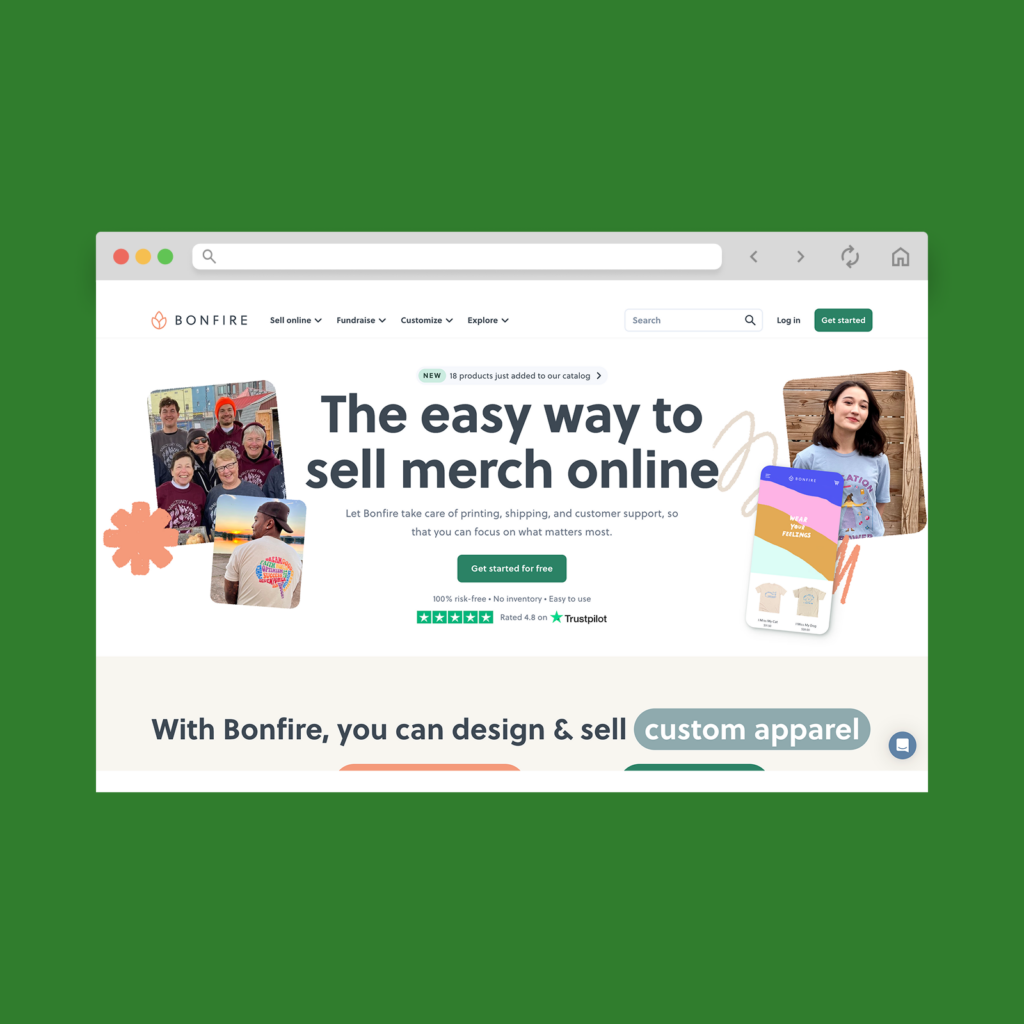
Bonfire specializes in custom apparel with a community-driven focus – perfect for those selling merch for fundraising or creators looking to grow their audience. They offer both Print on Demand and bulk orders. If selling to raise money for a verified non-profit, your processing fees are reduced from 8% to 2.5%, helping you earn even more for that cause that’s close to your heart.
Pros:
- On-site merch storesfor easy setup.
- High-quality printing and reliable fulfillment services.
- Affordable prices, especially for fundraising campaigns.
- Connect directly to the non-profit or cause you’re fundraising to simplify payouts.
Cons:
- Limited product selection.
- No integrations with external eCommerce platforms.
- Focused mainly on apparel, with fewer options for other product categories.
Product count: Not disclosed, but they have a selection of t-shirts, sweatshirts, tank tops, and accessories.
- Bonfire is completely free to use.
Best for: Fundraising campaigns supporting charities, nonprofits, and social causes.
8. Gooten
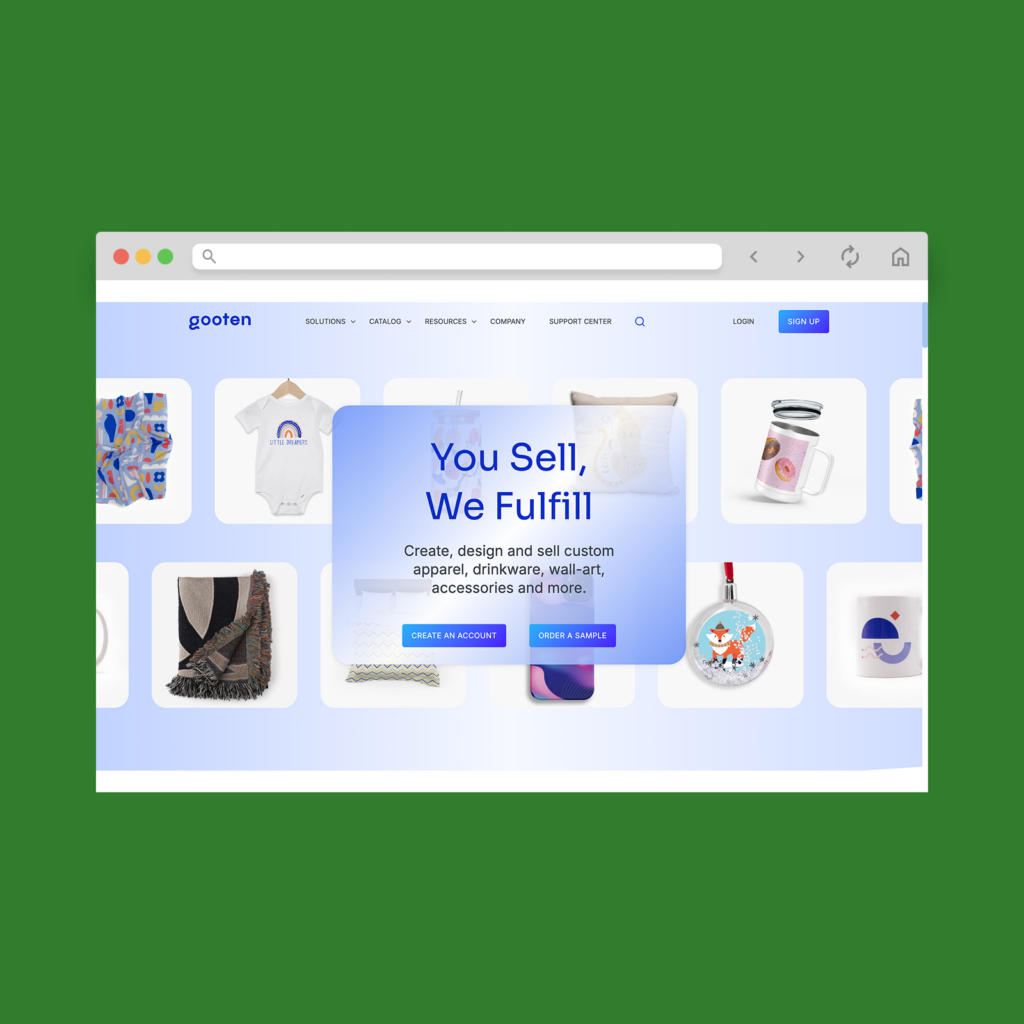
Gooten is a great Teespring alternative for those running larger print-on-demand businesses or looking to take things to the next level.
It has a large catalog of high-demand products and offers cost-effective pricing for bulk orders, making it ideal for businesses that prefer holding their own inventory. Profit margins typically range between 10% and 30%.
Pros:
- Carefully selected network of global manufacturers.
- Consistent product quality and efficient shipping.
- Integrations with major eCommerce platforms.
Cons:
- No built-in marketplace to attract organic traffic.
- Limited branding options compared to other print-on-demand platforms.
- Customer support response times may vary.
Product count: Over 300 customizable products across multiple categories.
Pricing:
- Gooten is free to use with no membership plans.
Best for: Those looking for a reliable order fulfillment platform and cost-effective bulk order pricing.
9. Teelaunch
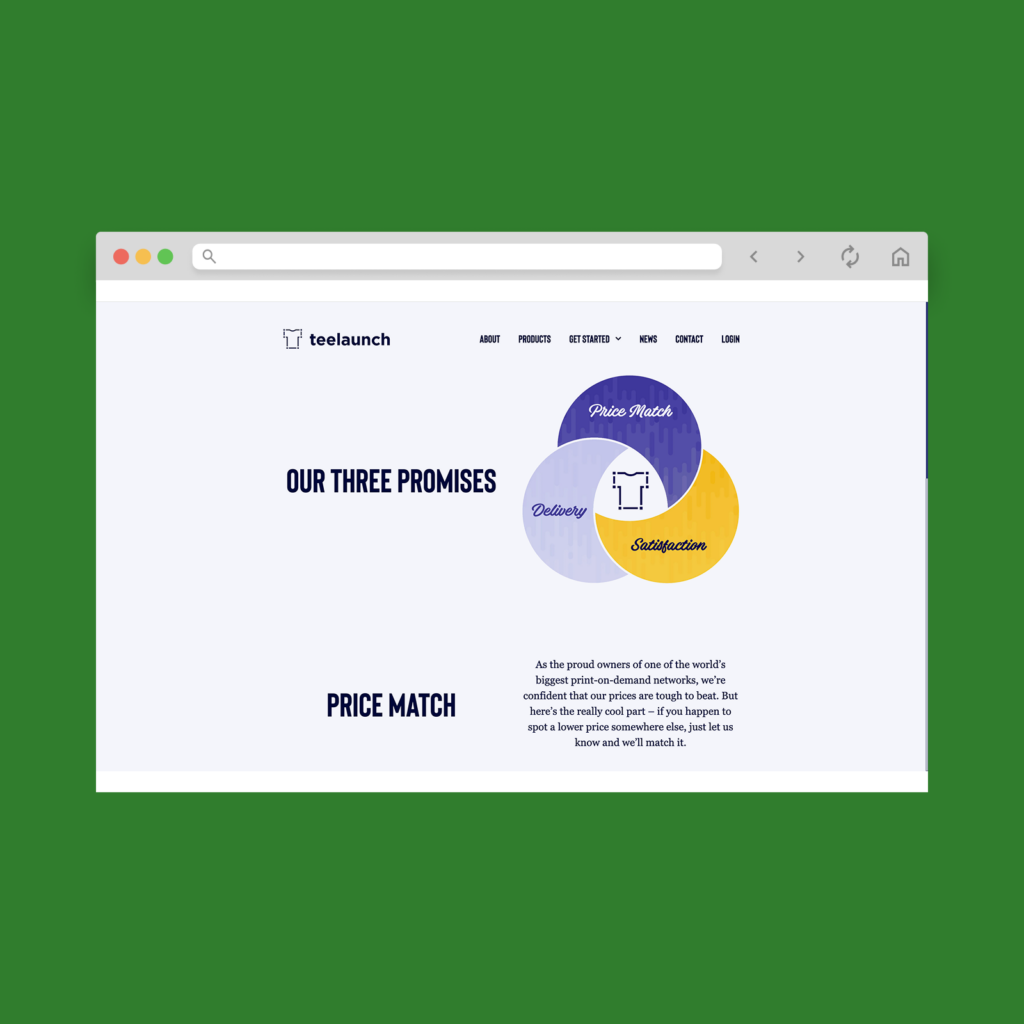
Teelaunch is a strong Teespring competitor for those who want to sell t-shirts online and customize other cool products. It’s been operating for over 75 years, proving their reliability and expertise. It has both in-house production and third-party print partners, giving merchants variety in how they source their products.
One big advantage of Teelaunch is their product selection, which includes laser-etched drinkware, headphones, sports balls, wooden cutting boards, and LED signs. This is great for merchants who target buyers looking for extra unique items.
Pros:
- Sellers can set their own retail prices.
- Effortless integration with eCommerce platforms.
- Price matching if you find a product cheaper with another POD provider.
- Bulk discounts on larger orders.
Cons:
- No built-in marketplace to drive organic traffic.
- Limited branding options compared to larger platforms.
- Shipping times may vary depending on the fulfillment location.
Product count: Over 300 products like custom t-shirts, home goods, and LED signs.
Pricing:
- Teelaunch is free to use.
Best for: Print-on-demand business ownerswho want to sell harder-to-find products.
Sell custom merchandise with Printify
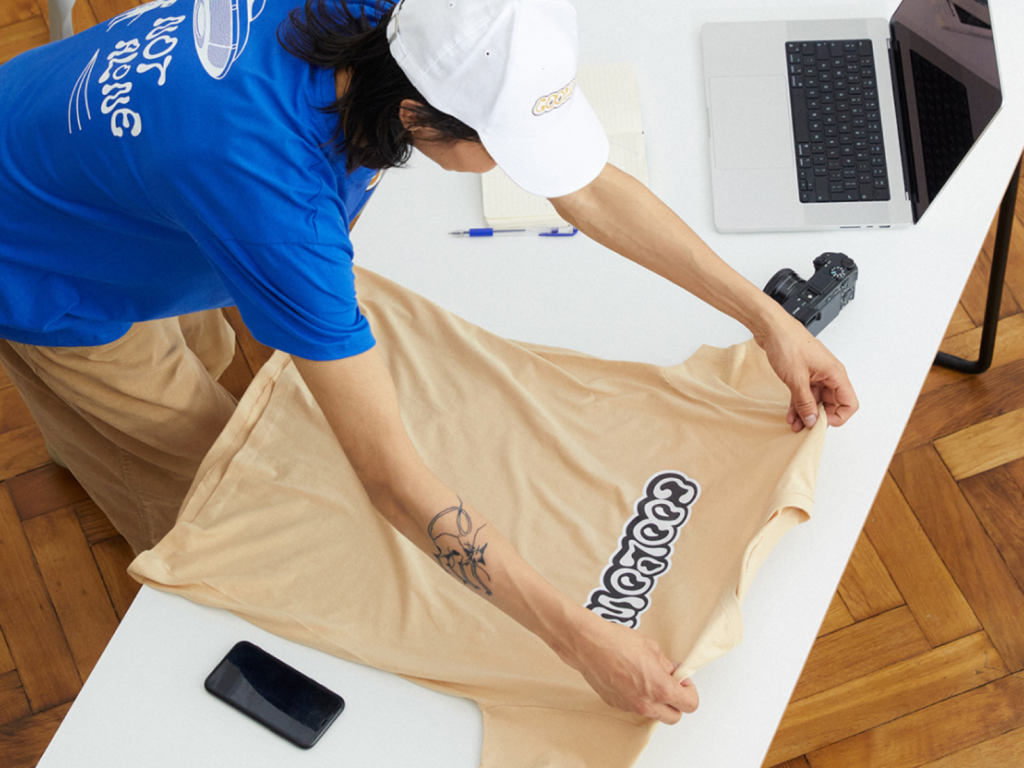
Looking for a Teespring alternative with high-profit margins, a wide range of products, global fulfillment, and fast delivery? Printify is the best option for turning your creative ideas into a thriving print-on-demand business.
1. Sign up
Create a free Printify account.
2. Pick your products
Browse our Product Catalog of over 1,300 popular products, including custom t-shirts, personalized hoodies, and phone cases.
3. Design your products
Once you’ve found the perfect item, click Start Designing. Use the Product Creator to upload your own designs or make something from scratch with our text editor, AI Image Generator, and pattern tool. Preview the design on high-resolution mockups and click Save.
4. Decide where to sell
Listing your products online is easy with Printify’s integrations. Sync your Printify account with your online store on eCommerce platformsand marketplaces like Shopify, Etsy,or Amazon.
5. Let Printify work for you
When a customer makes a purchase, our Print Providers produce and ship products directly to their doorsteps. In the meantime, focus on marketing and bringing in more sales.
FAQ
Among the alternatives to Teespring, Printify and Printful stand out as reliable platforms with a wide range of custom products, affordable pricing, and easy integrations to major eCommerce platforms.
Teespring and Redbubble both have unique advantages. Redbubble has a massive built-in audience but offers lower margins. Teespring users have better control over branding and pricing, plus they can sell digital products in addition to physical ones, but the platform requires sellers to have discount periods and meet sales targets.
Ultimately, it depends on your desired profit margins, how much time you want to spend on marketing, and what branding options you’d like to have.
Teespring’s biggest downside is its heavy competition and higher base prices, which can reduce your profits.
Yes, selling on Teespring can be profitable with the right marketing strategy and niche. Success depends on design quality and consistent promotional efforts to drive traffic and generate sales.
To summarize
While Teespring is a useful platform for selling products like t-shirts and art prints, the high prices and heavy competition may have you looking for a better option.
We’ve looked at other websites like Teespring and weighed their pros and cons to help you find the best alternative for your business, whether you’re selling clothing items, home decor, or more niche products like electronics.
If your main priorities are a large product range, high profit margins, extensive customization options, and 24/7 support, Printify is the Teespring alternative for you. Sign up today to take your business to new heights!
